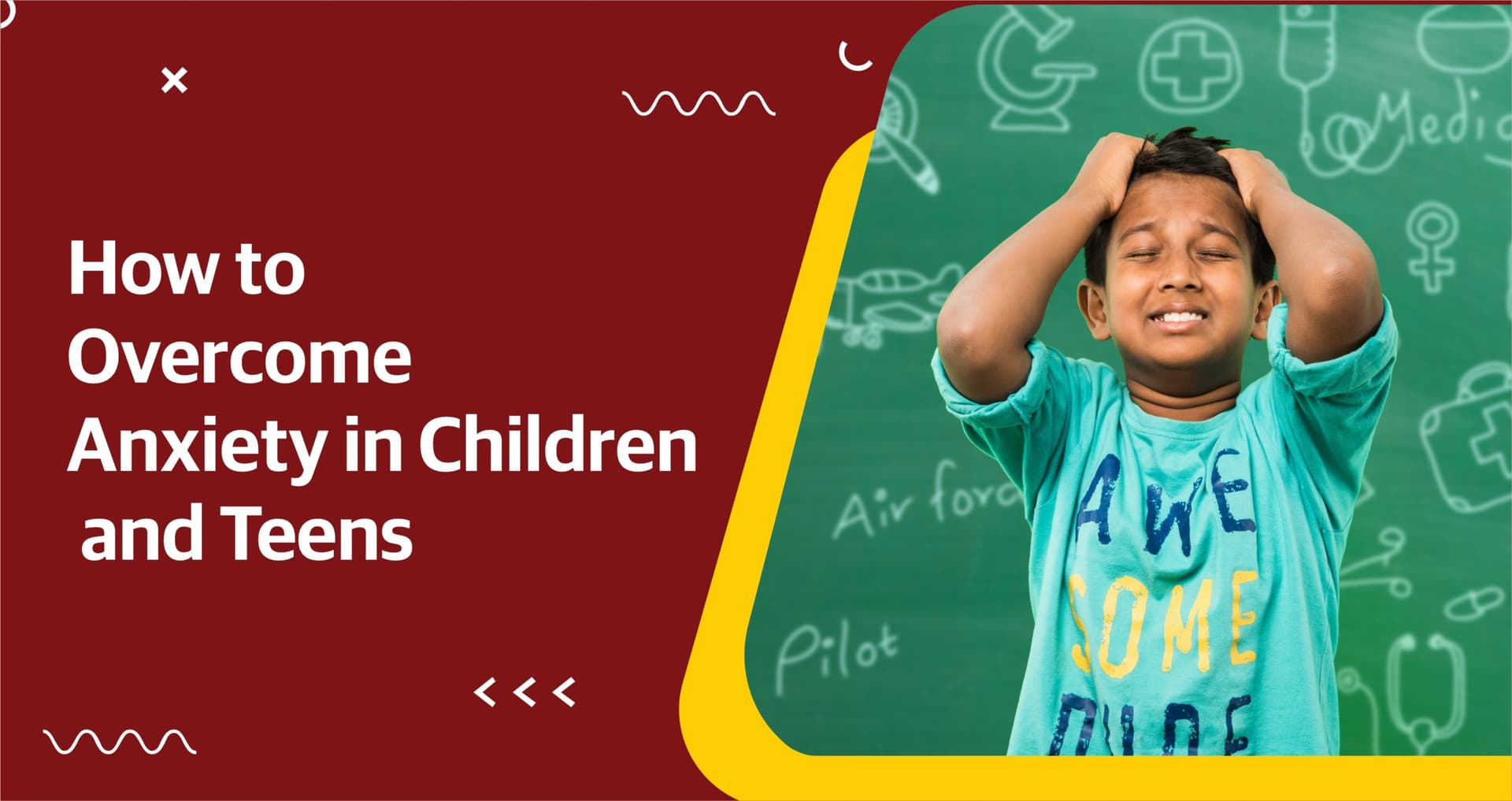How to Overcome Anxiety in Children and Teens
By Mautushi Paul |
Date 09-08-2024

Table of Contents
Admissions Open for
What is Meant by Anxiety in Children?
Anxiety can take many forms, including generalized anxiety (excessive worry about a number of things), phobias, or social anxiety disorder. Anxiety is more common in children and teens than in adults because their brains are still developing. Anxiety in children is more severe these days due to the increased pressure on children in school, with many having homework every night. Anxiety can be a debilitating experience for anyone, but when it is experienced by children and teens who are still developing their coping mechanisms, anxiety may lead to disrupted sleep patterns or family problems.
How to Recognize Anxiety in Children?
Anxiety takes on many different forms depending on the age of the person that has it, but there are also several signs you may notice if your child or teen suffers from anxiety: Mood swings, irritability, poor concentration, fatigue-just to name a few! You should be able to identify this based on your child or teen’s behavior and their physical characteristics.
What Causes Anxiety in Children?
Anxiety is caused by both external stressors (e.g., parental divorce) as well as internal ones such as genetic factors or temperament issues that make one more anxious than others. Anxiety also has strong connections with other mental health conditions like depression and bipolar disorder because people often have them at the same time without realizing they might have an underlying issue causing this problem.
How Anxiety in Children Affects Their Lives at Home and School?
Anxiety can make it hard for your child to get enough sleep which affects how well she/he will do both socially with friends as well as academically in school when they are tired all day. It also makes them feel less confident about themselves because they might find that they cannot complete tasks without being distracted by something else happening around them like noises outside or people talking nearby.
Anxiety also makes it hard for children to articulate themselves, so they might have a harder time responding or making conversation, which leads them to feel isolated from the people around them. They might also be embarrassed about having this problem because they fear that others will judge them as being weak if they cannot control how anxious or scared they feel. There are ways of getting anxiety under control, including things like relaxation exercises, deep breathing techniques, and meditation. All three of these practices require discipline but, once learned over time, can provide long-term relief from anxiety symptoms.
Different Ways to Overcome Anxiety in Children
Following are the important ways to overcome anxiety in children:
- Deep Breathing Exercise – Slowing down the breath helps regulate brain chemicals and reduces panic responses
- Mindfulness Exercise – This practice encourages people to live one moment at a time instead of worrying about what might happen next. It also trains individuals how to avoid negative thoughts or “rumination”
- Relaxation Exercises – Yoga poses, stretching, intentional breathing patterns have all been shown to reduce the level of stress hormones
- Journaling – Keep a journal of thoughts, feelings, and what is happening around you. This can help you identify the triggers that lead to anxiety or panic attacks
- Social Support – Social support offers emotional protection against Anxiety by providing validation during interactions with other important adults (e.g., teachers) who may be perceived as critical; sympathetic listeners when distressing events occur which can Reduce Anxiety
- Meditation – Meditation reduces Anxiety by reducing the level of stress hormones in your body; meditation also alters brain activity to increase levels of GABA which is a calming neurotransmitter.
- Exercise – Running, walking, cycling all release endorphins that can help you feel more relaxed and less anxious.
- Community Involvement- Joining a community group such as Scouts or soccer club will help give kids something to do after school and give them chances with other children their own age who may be dealing with similar challenges.
- Social Skills Training – Social skills training teaches anxiety and stress management strategies like how to deal appropriately when someone makes fun of us or rejects our advances; it also helps people develop coping mechanisms for those times we are alone because we are often more prone to anxiety when we’re by ourselves.
- Anxiety Coaching – Anxiety coaching is a process of working one-on-one with an expert who has training in cognitive behavioral therapy and can help work on specific goals that the client sets for themselves, such as overcoming their fear of .
- or driving.
- School Anxiety Support Group – School Anxiety Support Groups meet once every week during lunchtime where they discuss topics like what triggers your worries about school and how you would handle them if they happen again; this can be really helpful because it gives people a chance to share thoughts and feelings without being judged while also getting feedback from others their age.
Conclusion
The best way to help a child or teen overcome anxiety is with the support of their parents. If you are struggling to find what works for your family, there are many resources out there that can help. But no matter where you go, one thing remains true: it’s important not only to provide encouragement and understanding but also to keep them safe from harm by removing them from any risky situations they may be exposed to. Do note that anxiety is very comorbid and may show up with other mental health ailments like depression. We hope that the above blog will definitely help you overcome anxiety in children.
Also Read:
CBSE Schools In Popular Cities
- CBSE Schools in Bangalore
- CBSE Schools in Mumbai
- CBSE Schools in Pune
- CBSE Schools in Hyderabad
- CBSE Schools in Chennai
- CBSE Schools in Gurgaon
- CBSE Schools in Kolkata
- CBSE Schools in Indore
- CBSE Schools in Sonipat
- CBSE Schools in Delhi
- CBSE Schools in Rohtak
- CBSE Schools in Bhopal
- CBSE Schools in Aurangabad
- CBSE Schools in Jabalpur
- CBSE Schools in Jaipur
- CBSE Schools in Jodhpur
- CBSE Schools in Nagpur
- CBSE Schools in Ahmednagar
- CBSE School In Tumkur

Call Us to know more about Orchids
Swipe Up

















